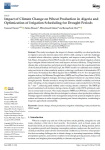Ouzani Y., Hiouani F., Ahmad M.J., Choi K.-S. (2025). Impact of climate change on wheat production in Algeria and optimization of irrigation scheduling for drought periods. Water, 01/06/2025, vol. 17, n. 11, p. 1658.
https://doi.org/10.3390/w17111658
https://doi.org/10.3390/w17111658
| Titre : | Impact of climate change on wheat production in Algeria and optimization of irrigation scheduling for drought periods (2025) |
| Auteurs : | Y. Ouzani ; F. Hiouani ; M.J. Ahmad ; K.-S. Choi |
| Type de document : | Article |
| Dans : | Water (vol. 17, n. 11, June 2025) |
| Article en page(s) : | p. 1658 |
| Langues : | Anglais |
| Langues du résumé : | Anglais |
| Catégories : |
Catégories principales 07 - ENVIRONNEMENT ; 7.3 - Eau. Gestion de l'EauThésaurus IAMM CHANGEMENT CLIMATIQUE ; GESTION DES EAUX ; CEREALICULTURE ; BLE ; METHODE D'OPTIMISATION ; IRRIGATION ; ALGERIE |
| Résumé : | This study investigates the impact of climate variability on wheat production in Algeria’s semi-arid interior plains from 2014 to 2024, aiming to curb the challenges of rainfed wheat cultivation, optimize irrigation, and improve water productivity. The Soil–Water–Atmosphere–Plant (SWAP) model-driven approach refined irrigation scheduling to mitigate climate-induced losses and improve resource efficiency. Using historical climate data, soil properties, and wheat growth observations from the experimental farm of the Technical Institute for Field Crops, the SWAP model was calibrated and validated using one-factor-at-a-time sensitivity analysis, achieving a coefficient of determination (R2) of 0.93 and a Normalized Root Mean Squared Error (NRMSE) of 17.75. Two drought-based irrigation indices, Soil Moisture Drought Index (SMDI) and Crop Water Stress Index (CWSI), guided adaptive irrigation strategies, showing a significant reduction in crop failure during drought periods. Results revealed a strong link between rainfall variability and wheat yield. Adopting a 9-day irrigation interval could increase water productivity to 18.91 kg ha−1 mm−1, enhancing yield stability under varying climatic conditions. The SMDI approach maintained soil moisture during extreme drought, while CWSI optimized water use in normal and wet years. This study integrates SMDI and CWSI into a validated irrigation framework, offering data-driven strategies to enhance wheat production resilience. Findings support sustainable water management and provide practical insights for policymakers and farmers to refine irrigation planning and climate adaptation, contributing to long-term agricultural sustainability. |
| Cote : | En ligne |
| URL / DOI : | https://doi.org/10.3390/w17111658 |







